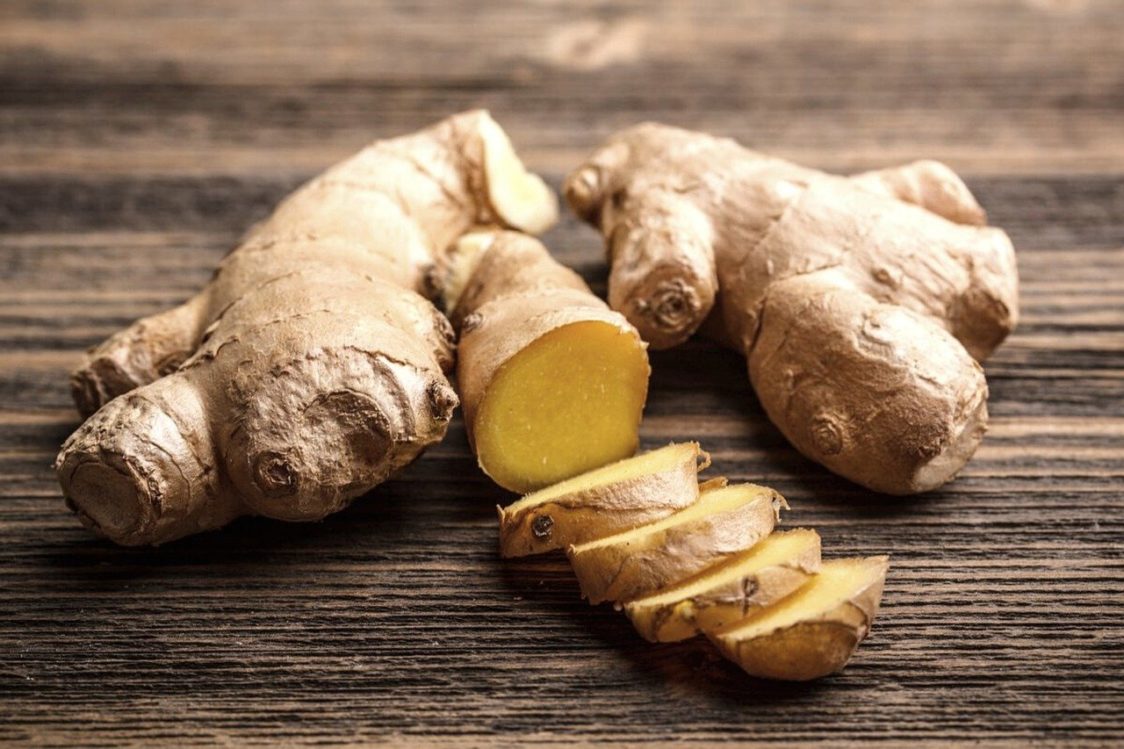Table of Contents
Almost everyone has tried ginger. We can use it to make tea, add to foods, eat it with sushi, drink it in the form of small shots, and the craziest of us even eat raw ginger. All of these options are a great way to improve our health, digestion, relieve menstrual cramps, and even promote weight loss. You don’t believe it? Let’s take a look at its properties and benefits together. You will see that after reading our article, you will immediately want to buy some ginger.
Where did Ginger come from?
Ginger most likely comes from Asia, where it was used for a thousand years to season food and treat disease. Ginger, as we know it, is basically a root that is harvested from the rhizome of ginger and in stores we most often find it in several forms:
- black ginger – a root with unpeeled rhizomes
- white ginger – a root with peeled rhizomes
- pink ginger – a root with peeled rhizomes, usually sliced and pickled in brine

Whether you love it or hate it, remember that it offers many benefits, which makes it worth adding to your diet. It contains antioxidants, which are beneficial, especially in the autumn because it may protect you from cold or flu. Simultaneously, it also helps reduce appetite, so if you want to lose weight, ginger tea may come in handy. However, if you still don’t like its taste, try ginger shot, which is usually enriched with other ingredients, such as coconut water or honey, to make ginger taste better. Try it, and maybe you will even like the ginger shot better than a shot of hard alcohol.
Nutritional values of ginger
7 benefits of ginger
1. Helps with weight loss

The effect of ginger on weight loss has been confirmed by several studies. The first one focused on 80 obese women aged 18-45 years, who were divided into two groups. The first one was receiving a placebo and the second one – 2 g of ginger powder. After 12 weeks, there was a reduction in blood insulin levels and body mass index (BMI) in the group receiving ginger. The results were confirmed in the 2019 research which stated that ginger supplementation helps to significantly reduce body weight and body circumference in overweight or obese people. [1] [2]
Likewise, the consumption of hot ginger tea had the same effect on weight reduction. The results of a qualitative study showed increase in thermogenesis (heat production), lower hunger and greater fullness in men who drank ginger tea every day. [3]
So, if you want to lose weight, ginger may come in useful. If you have set reasonable caloric deficit and you are still often hungry, drinking ginger tea could be the solution to your problem. If you are tempted by sugar cravings, try slowly sipping ginger shot. You will see that the cravings will stop quickly, and in addition this will contribute to your health. If that doesn’t work, you can try our Appetite Control, which also helps reduce appetite and thus control weight.
You might be interested in these products:
2. Reduces nausea
Nausea can have many causes. Based on research, we can say with certainty that ginger is helpful, for example, during pregnancy. According to experts, ginger contains the volatile oils and phenolic compounds, also called gingeroles, which can help with morning sickness. However, it should not be consumed just before birth, but rather in the first two trimesters. [4] [6]
Generally, ginger has many positive effects on the digestive system. It improves digestion and helps to treat intestinal colic or flatulence. It can even help with diarrhea and other digestive problems. For example, if you overdo it with alcohol in the evening and feel hungover the morning after, ginger can calm an upset stomach and improve overall digestion. But don’t expect miracles. Even ginger won’t save you after a big party. [5] [7] [8]
3. Relieves pain

Painful menstruation can be annoying, especially when you know that it will be waiting for you again in a month. If you have already tried all the methods to alleviate it and it was still unsuccessful, try including ginger in your diet.
Its effectiveness was also confirmed by a study on 150 women. Participants were divided into two groups. The first group took ginger during the first 3 days of menstruation, while members of another group received painkillers – mefenamic acid or ibuprofen. Ginger has been shown to be as effective in treating menstrual cramps as the other two pain medications used.
Moreover, ginger has also positive benefits for men’s health. Ginger can also relieve joint, muscle pain or headache because it has similar effects as non-steroidal anti-inflammatory drugs (Aspirin, Ibalgin, Ibuprofen or Paracetamol) in the body. In addition, it also has antioxidant and antibacterial properties. [9] [10] [18]
4. Supports immunity
Ginger also has antioxidant and anti-inflammatory effects, which help strengthen the immune system. It helps to ensure that the immune system can protect the body from possibly harmful substances, thus keeping it in shape. In addition, ginger also has strong antiviral and antibacterial effects. One study even showed a positive effect of ginger in the treatment of respiratory diseases. [11] [12]
So if you often get sick and lie in bed with the flu, cough or cold in the autumn, ginger can help you fight the disease. For more tips on helping the body fight off the illness, read our article 15 Ways to Strengthen Your Immune System and Protect Your Health.
5. Helps with treatment
If you have underestimated disease prevention, you should at least start using ginger in the treatment of the disease itself. It can help you with throat infections or reduce sinusitis. It can reduce fever, suppress dry irritating cough and reduce airway inflammation. During the disease, consumption of ginger can also enhance thermogenesis, which can help you sweat out a sickness. Among other things, ginger can reduce oxidative stress, which is the result of excessive amounts of free radicals in the body. [13] [14]
If you decided to try ginger, you have many options here. In addition to tea and shots, you can also try to suck on ginger lozenges, which will moisturize your throat, relieve soreness and make coughing easier, or you can try ginger steam inhalation, which will help clear your clogged nose. Ginger compress or patch, which you can put on your neck or chest, will also serve you well.

6. It can improve brain function
Another important function of ginger is its ability to reduce oxidative stress, which is the result of excessive amounts of free radicals in the body. The oxidative stress together with chronic inflammation can accelerate the ageing process. For instance, the effect of ginger on brain activity has been studied by researchers in healthy middle-aged women. They found that regular consumption of ginger extract improves reaction time and spatial working memory. However, it may also prevent Alzheimer’s disease. [13] [14] [15]
7. It has a positive effect on heart function, sugar and cholesterol levels
The last benefit of ginger, which we would like to present in our article, is its positive effect on heart activity and cholesterol levels. The study showed that only 2 grams of ginger powder a day, taken by participants with type 2 diabetes on an empty stomach, reduced their blood sugar by 12%. And we should also mention positive effects in lowering cholesterol levels. [16] [17]
Further research revealed a positive effect of ginger on heart function and blood pressure. Its regular consumption has been shown to help lower blood pressure, prevent blood clots, heart attacks and improve blood circulation. [17]
Bonus tip for men
At this point, we will certainly please both men and women. Indeed, the results of earlier studies show that in men, who have low testosterone levels for some reason, ginger has a positive effect on increasing sperm count, motility, viability and even ejaculate volume. Therefore, ginger should be definitely added in men’s diet. [19]
How to consume ginger? Try these 5 tips
Based on the above-mentioned benefits of ginger, there can be no doubt about its positive effect. In the next section, we will introduce you to several ways you can consume ginger and enjoy its effects.
1. Ginger shot
If you are not a fan of fresh ginger, the easiest option is to drink so-called shots that have lately become more and more popular. In addition to concentrated juice, they also contain, for example, coconut water, honey or lemon, which make the consumption of ginger more enjoyable. You may even fall in love with these shots.
Depending on your taste, you can choose two ways to drink the shot. You can either drink it all at once and enjoy a slight burn, or you can drink it sip by sip. Moreover, both ways can help you drive away sweet cravings thanks to spicy taste.

2. Ginger syrup
Ginger syrup is very easy to prepare. All you need is ginger, water, lemon and sugar. You can add the optimal amount of individual ingredients according to your taste. For starters, add 200 g of ginger, 400 g of sugar, 4 cups of water and a few teaspoons of lemon juice. If the syrup is too strong for you, just add water. You can also use it to make tea.
3. Ginger tea
Ginger tea, which warms the whole body, is an undying classic not only during winter. Haven’t you heard that ginger tea is good for a cold? If you don’t like ginger tea, try adding some lemon and honey. This trio tastes delicious, and it also helps your body ward off germs. To get used to its specific taste, you can add, for example, a bag of fruit tea to the ginger tea. This will soften the taste of ginger, but its benefits will not disappear. Maybe after some time you will start to like fresh ginger tea by itself.

4. Smoothie
Another option to incorporate ginger into your diet is to add it to a smoothie. It doesn’t matter what it contains unless it is fruit or vegetables. The slightly spicy taste of ginger will refresh every combination.
5. Add to food
At this point, especially lovers of spicy foods should start paying attention. If you love the taste of hot pepper, spices, garlic or wasabi, you should definitely try adding ginger to your meals. It gives an interesting taste to broth, soup, but also to the main course. It is therefore not surprising that in Asia, for example, it is a widely used cooking ingredient. If you love, for instance, Vietnamese Pho Bo soup, then you already love ginger taste in food.
What you should remember?
The benefits of ginger are unquestionable. This inconspicuous plant can help us lose weight, reduce nausea, relieve pain, prevent and treat disease, and also lower blood pressure and sugar or cholesterol levels. We should also mention its positive effect on memory and cognitive function.
If you don’t like fresh ginger itself, you can combine it with some tea, try ginger shots, make syrup from it, or simply add it to a meal or smoothie. If you try ginger, you will see that it has only a positive effect on the body, so it is worth dealing with the burning after its consumption.
What about you, do you like ginger, or you can’t even stand its spicy taste? If you have any tips on how to consume ginger, share it with others. If you have any haters of ginger among your friends, share this article with them. Maybe you can convince them to try a ginger shot with you next time.
[1] Attari a kol - Changes of serum adipocytokines and body weight following Zingiber officinale supplementation in obese women: a RCT – https://link.springer.com/article/10.1007/s00394-015-1027-6
[2] Crofts a kol - Hyperinsulinemia: A unifying theory of chronic disease? – https://diabesity.ejournals.ca/index.php/diabesity/article/viewFile/19/61
[3] Mansour - Ginger consumption enhances the thermic effect of food and promotes feelings of satiety without affecting metabolic and hormonal parameters in overweight men: A pilot study – https://www.ncbi.nlm.nih.gov/pmc/articles/PMC3408800/
[4] Willetts a kol - Effect of a ginger extract on pregnancy‐induced nausea: A randomised controlled trial – https://doi.org/10.1046/j.0004-8666.2003.00039.x
[5] Khodaie - Ginger From Ancient Times to the New Outlook – https://www.researchgate.net/publication/274900873_Ginger_From_Ancient_Times_to_the_New_Outlook
[6] Lindblad - Ginger for nausea and vomiting of pregnancy – https://www.ncbi.nlm.nih.gov/pmc/articles/PMC4755634/
[7] Efficacy of ginger for nausea and vomiting: a systematic review of randomized clinical trials – https://academic.oup.com/bja/article/84/3/367/264600
[8] Wang - Natural Products for the Prevention and Treatment of Hangover and Alcohol Use Disorder – https://www.mdpi.com/1420-3049/21/1/64/htm
[9] Ozgoli - Comparison of effects of ginger, mefenamic acid, and ibuprofen on pain in women with primary dysmenorrhea – https://pubmed.ncbi.nlm.nih.gov/19216660/
[10] Lakhan a kol. - Zingiberaceae extracts for pain: a systematic review and meta-analysis https://nutritionj.biomedcentral.com/articles/10.1186/s12937-015-0038-8]
[11] Rizzetto - Connecting the immune system, systemic chronic inflammation and the gut microbiome: The role of sex – https://pubmed.ncbi.nlm.nih.gov/29861127/
[12] Chang - Fresh ginger (Zingiber officinale) has anti-viral activity against human respiratory syncytial virus in human respiratory tract cell lines – https://pubmed.ncbi.nlm.nih.gov/23123794/
[13] Bhatt a kol. - GINGER: A FUNCTIONAL HERB – https://www.researchgate.net/profile/Mostafa_Waly2/publication/257416254_Ginger_A_functional_herb/links/0deec538e156f37e9a000000/Ginger-A-functional-herb.pdf
[14] Wang - Biological properties of 6-gingerol: a brief review – https://pubmed.ncbi.nlm.nih.gov/25230520/
[15] Saenghong - Zingiber officinale Improves Cognitive Function of the Middle-Aged Healthy Women – https://www.ncbi.nlm.nih.gov/pmc/articles/PMC3253463/
[16] Khandouzi - The Effects of Ginger on Fasting Blood Sugar, Hemoglobin A1c, Apolipoprotein B, Apolipoprotein A-I and Malondialdehyde in Type 2 Diabetic Patients – https://www.ncbi.nlm.nih.gov/pmc/articles/PMC4277626/
[17] Wang a kol - Evaluation of daily ginger consumption for the prevention of chronic diseases in adults: A cross-sectional study – https://pubmed.ncbi.nlm.nih.gov/28336112/
[18] Rahmani - Active ingredients of ginger as potential candidates in the prevention and treatment of diseases via modulation of biological activities – https://www.ncbi.nlm.nih.gov/pmc/articles/PMC4106649/
[19] Mares - The effect of Ginger on semen parameters and serum FSH, LH & testosterone of infertile men – https://www.iasj.net/iasj?func=fulltext&aId=71548
